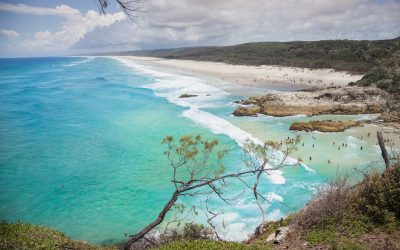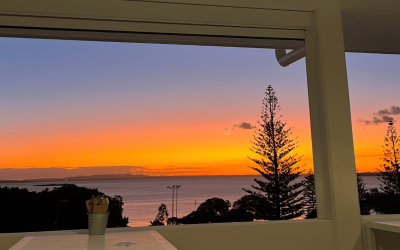If you’re lucky enough to have visited Straddie for a beach holiday, chances are you’ve driven past Myora Springs even if you’ve never slowed down and stopped to take a look. The East Coast Road that runs from Dunwich towards Amity and Point Lookout crosses directly over Capembah creek, which flows out into Moreton Bay at Myora Springs.
On the eastern side, fresh spring water flows from the island hinterland through the undergrowth, while crayfish dart across the leaf-littered, sandy bottom of the creek. The water then flows under the road and cascades down to the sand and silt and mangroves that await it at sea level below. The line between cool subtropical forest and mangrove flats is as blurred as the salt and fresh water mingling in the shallows, different densities and temperatures swirling as the tide ebbs and flows. It is a magical spot, and it inspired our take on the traditional Gose style.
Sour beers are gaining in popularity and are particularly suited to our warm climate in South East Queensland. Gose (pronounced GOHZ-uh, rhymes with Rosa) is a good introduction to the world of sour beer, as it tends to be more subtle, fresher and less acidic than some of the funkier lambic and barrel aged styles. We had always planned a sour beer as part of our core range, but it was when we started to delve into how we could tie our beers to the places that they’re named for that the penny dropped for the Myora Springs Gose.
“The image of sand filtered fresh water mingling with the salt water of Moreton Bay just jumped out as perfectly connected to the salt enhanced Gose.”
Named for the Gose river in Germany, the style grew in popularity for hundreds of years only to disappear almost entirely in the mid to late 20th century. Since the late 1990s it has regained popularity both in its traditional home in Germany and through modern interpretations brewed by craft brewers around the world. It should be very refreshing but also full of character and flavour from the mixture of tastes and aromas imparted by the ingredients and mixed culture ferment.
Gose in the traditional style is brewed with 50% or more wheat malt, spiced with coriander, has a lemon sour character from lactobacillus bacteria (as seen in yoghurt) and a distinct saltiness, either from the local water or the addition of salt.
In our Myora Springs Gose, we’ve dropped the divisive coriander in favour of Desert Lime (Citrus glauca), a native citrus with a gorgeous aroma and piquant flavour, sustainably sourced and freeze dried by Australian-owned NATIF.
The grain bill for our Gose is a simple mix of wheat and pilsner malt, which is balanced mostly by the sourness imparted by a warm lactobacillus ferment and the addition of pink Himalayan rock salt. A clean German ale yeast does the rest of the work fermenting the beer and balancing all of the flavours, resulting in a dry, zesty, hazy and supremely refreshing ale. It has been a crowd favourite with family and friends as we’ve brewed pilot batches perfecting the recipe and process; I love drinking this beer and hope you do too.
Cheers to that!
Beernote:
Until our Island brewery is constructed, we are brewing our beers a batch at a time, whenever there is some brewery space to spare at Ballistic Beer Co, Salisbury. For this, we are forever grateful. The Ballistic team have a well-earned reputation of making award winning beers of exceptional quality and have the water treatment (reverse osmosis) equipment necessary to create a good representation of the water profile we will eventually be brewing with on Straddie.


